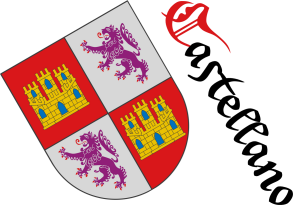
![Ver [Kleisner, T.; 2009] en referencias bibliográficas. Libro abierto, hojas de plata, filo de oro, guardas de gules, tapas de sable.](../css/Libro.Bibliografia.png)
Kleisner, T.; 2009
Tomá Kleisner, «Amat Victoria Curam: The Device of Archduke Matthias on his Medals», Studia Rudolphina, issue 9, pages 87-99, bulletin of the Research Center for Visual Arts and Culture in the Age of Rudolf II (Research Center for Graphic Arts and Culture in the Age of Rudolf II, founded in January 2000), from the Institute of Art History, Academy of Sciences of the Czech Republic. edited by Lubomír Konecný and Beket Bukovinská, published by Artefactum, ISBN 978-80-86890-27-2, ISSN 1213-5372, Prague, 2009.
The article reviews the use of the motto «Amat victoria curam» by Archduke Matthias on his medals and coats of arms, which he used as early as 1579, at the age of 22.
Regarding the origin of the motto «Amat victoria curam», Tomá Kleisner refers us to the verses of [Catullus, C. V.; Century I B.C.; poem LVII, verse 16].
Bibliographical reference of century XXI.
The author is Kleisner, Tomá.
External resources:
Internal resources: KleisnerT2009.AmatVictoriaCuram.Original.pdf original and KleisnerT2009.AmatVictoriaCuram.Resumen.pdf summary.


ANPC
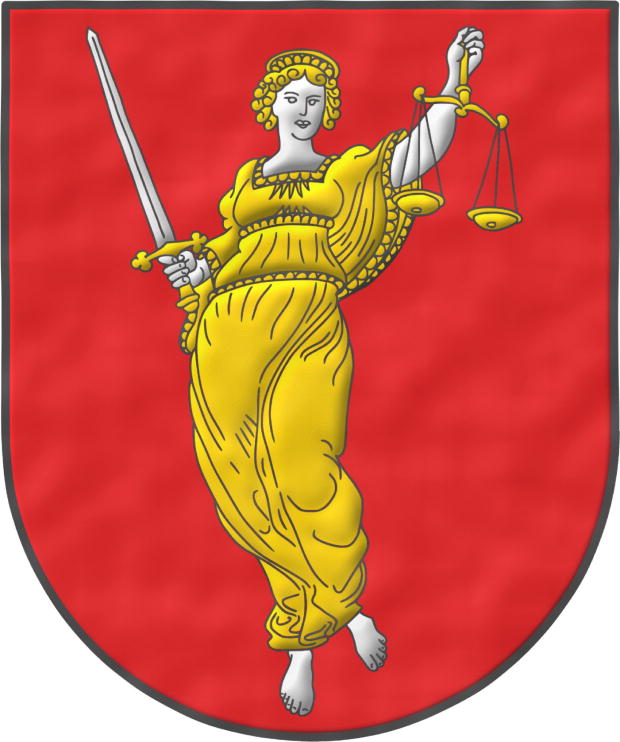
Azure, a Female representing Justice Argent, clothed Or, holding in the dexter hand a Sword Argent, garnished Or, and in the sinister hand Pair of Scales Or.
Escudo de gules, una Justicia de plata, vestida de oro, en su diestra una espada de plata, alzada, guarnecida de oro y en su siniestra una balanza de oro.
Coat of arms organized by me, based on a previous ideation by the ANPC, with the following characteristics: the mouth of the shield is rounded and is outlined in sable at double my usual thickness;
The National Association of Criminology Experts and Experts in Forensic Sciences for the Courts of Justice, as can be consulted at its address Asociacion-ANPC.es, groups university graduates in Criminology and prestigious experts in the different specialties of the forensic and expert areas.
Blazon keywords: Without divisions, Gules, Argent, Or, Female figure, One, Justice, Vested, Dexter, Sword, Point upwards, Hilted, Sinister and Pair of scales.
Style keywords: Watercolor, Illuminated, Semi-circular and Outlined in the field tincture.
Classification: Coat of arms, Created and Socioeconomic.
Bearer: ANPC.


ANPC, shield with crest and motto
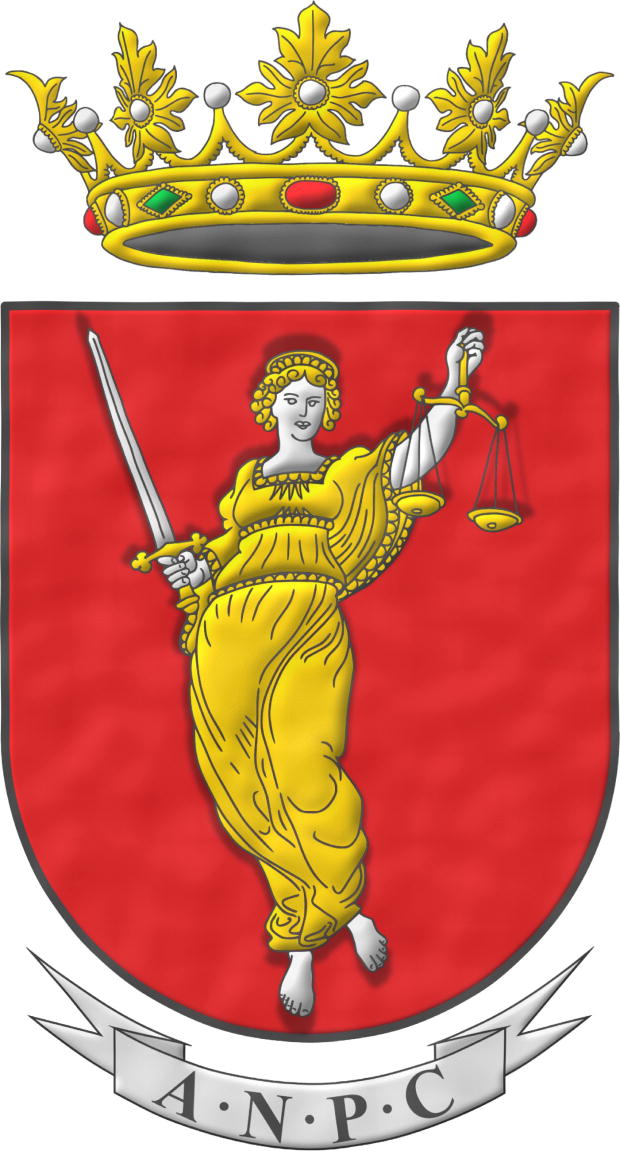
National Association of Criminology Experts and Experts in Forensic Sciences for the Courts of Justice.
Azure, a Female representing Justice Argent, clothed Or, holding in the dexter hand a Sword Argent, garnished Or, and in the sinister hand Pair of Scales Or. Crest: An open royal crown Or. Motto: «ANPC».
Escudo de gules, una Justicia de plata, vestida de oro, en su diestra una espada de plata, alzada, guarnecida de oro y en su siniestra una balanza de oro. Timbrado de una corona real abierta. Divisa: «ANPC».
Coat of arms that I have organized based on a previous idea from the ANPC, in the following way: the mouth of the shield is rounded and is outlined at double my usual thickness; the whole is enamelled in gules, argent and or, illuminated, outlined in sable and with a watercolor finish; and to separate the letters of the motto a dot «·» is used at mid-height.
[Cadenas y Vicent, V. de; 1975; page 119 and following] dedicates its chapter 7 to «representative heraldry» and, within it, its first section to «professional heraldry», to which this coat of arms belongs according to his classification, and defines it as that which «corresponds to and reflects... all the emblems of the different professions, professional associations, societies where people with the same hobbies or pastimes are grouped». The other 3 categories that, together with «professional heraldry», make up «representative heraldry» are «industrial», «sport» and «tourism».
Personally, I follow my own heraldic classification, which follows to some extent [Cadenas y Vicent, V. de; 1975], in which the coats of arms of associations like the ANPC are classified within what I call socioeconomic heraldry.
Blazon keywords: Without divisions, Gules, Argent, Or, Female figure, One, Justice, Vested, Dexter, Sword, Point upwards, Hilted, Sinister, Pair of scales, Crest, Open royal crown, Crown and Motto (identification).
Style keywords: Watercolor, Illuminated, Shaded, Semi-circular and Outlined in the field tincture.
Classification: Coat of arms, Created and Socioeconomic.
Bearer: ANPC.


ANPC, emblem with shield, mottos and banners
![ANPC, emblem with shield, mottos and banners Emblem containing a [ shield de gules, una Justicia de plata, vestida de oro, en su diestra una espada de plata, alzada, guarnecida de oro y en su siniestra una balanza de oro. Crest: An open royal crown Or ]. Two banners and two mottos surround the shield.](../escudo_armas/Anpc.23.Divisa.Lema.TintaPlana.Acuarelado.jpg)
Emblem containing a [ shield de gules, una Justicia de plata, vestida de oro, en su diestra una espada de plata, alzada, guarnecida de oro y en su siniestra una balanza de oro. Crest: An open royal crown Or ]. Two banners and two mottos surround the shield.
Emblema que contiene un [ escudo de gules, una Justicia de plata, vestida de oro, en su diestra una espada de plata, alzada, guarnecida de oro y en su siniestra una balanza de oro. Timbrado de una corona real abierta ]. Dos divisas y dos lemas rodean el escudo.
The 2 banners and the 2 mottos have azure and argent letters, on argent and azure bordered in gules, they are accompanied by 3 stars, 2 smaller ones in azure and 1 larger one in argent; The banners and mottos surround the ANPC shield forming an oval; and I have executed the ensemble in flat colors and with a watercolor finish.
The 2 banners that identify the ANPC are:
- «National Association of Criminology Experts and Experts in Forensic Sciences for the Courts of Justice.».
- «ANPC».
The 2 mottos that express the fundamental motivations of the ANPC are:
- «Loyal knowledge and understanding for the Administration of Justice».
- «Forensic criminologists for the Courts of Justice».
I use the term «banner» when the purpose of the text is to identify the holder and I use the term «motto» when it expresses the holder's motivations, principles, rules, ideals, etc. This distinction is detailed further in the article: Motto, banner, device and war cry.
Blazon keywords: Without divisions, Gules, Argent, Or, Female figure, One, Justice, Vested, Dexter, Sword, Point upwards, Hilted, Sinister, Pair of scales, Crest, Open royal crown, Crown, Motto (identification) and Motto.
Style keywords: Watercolor, Plain tincture, Semi-circular and Outlined in the field tincture.
Classification: Emblem, Created and Socioeconomic.
Bearer: ANPC.


ANPC, illuminated and shaded emblem
![ANPC, illuminated and shaded emblem Emblem containing a [ shield de gules, una Justicia de plata, vestida de oro, en su diestra una espada de plata, alzada, guarnecida de oro y en su siniestra una balanza de oro. Crest: An open royal crown Or ]. Two banners and two mottos surround the shield.](../escudo_armas/Anpc.24.Divisa.Lema.MetalMuyBatido.jpg)
Emblem containing a [ shield de gules, una Justicia de plata, vestida de oro, en su diestra una espada de plata, alzada, guarnecida de oro y en su siniestra una balanza de oro. Crest: An open royal crown Or ]. Two banners and two mottos surround the shield.
Emblema que contiene un [ escudo de gules, una Justicia de plata, vestida de oro, en su diestra una espada de plata, alzada, guarnecida de oro y en su siniestra una balanza de oro. Timbrado de una corona real abierta ]. Dos divisas y dos lemas rodean el escudo.
I have illuminated the shield inside the emblem with gules, argent and or tinctures; the figure of Justice is shaded; The banners and mottos have argent and azure letters accompanied by 3 stars; the shape of the emblem is oval; and the ensemble has a lightly hammered metal finish.
In the descriptions of objects that contain coats of arms, for example, this ANPC emblem, I put the blazon of the shield in square brackets following its rules and, outside of these brackets, the description of the exterior ensemble of the emblem. The reason for this is that it is in these descriptions of the exterior where the language of the blazon is not always totally applicable.
Blazon keywords: Without divisions, Gules, Argent, Or, Female figure, One, Justice, Vested, Dexter, Sword, Point upwards, Hilted, Sinister, Pair of scales, Crest, Open royal crown, Crown, Motto (identification) and Motto.
Style keywords: Watercolor, Illuminated, Shaded, Semi-circular and Outlined in the field tincture.
Classification: Emblem, Created and Socioeconomic.
Bearer: ANPC.


ANPC, video of the blazon
This video visualizes the ANPC emblem and the blazon, step by step, of the shield it contains. The typography used belongs to Dr.a Marianne Steinbauer and the soundtrack is «Egmont Overture Opus 84» by Ludwig van Beethoven performed by the «Musopen Symphony».
Credits: Kevin MacLeod es el autor de la música and Dr.ª Marianne Steinbauer tiene los derechos del tipo de letra.
Blazon keywords: Without divisions, Gules, Argent, Or, Female figure, One, Justice, Vested, Dexter, Sword, Point upwards, Hilted, Sinister, Pair of scales, Crest, Open royal crown, Crown, Motto (identification) and Motto.
Style keywords: Watercolor, Illuminated, Shaded, Semi-circular and Outlined in the field tincture.
Classification: Video, Created and Socioeconomic.
Bearer: ANPC.


ANPC, association seal
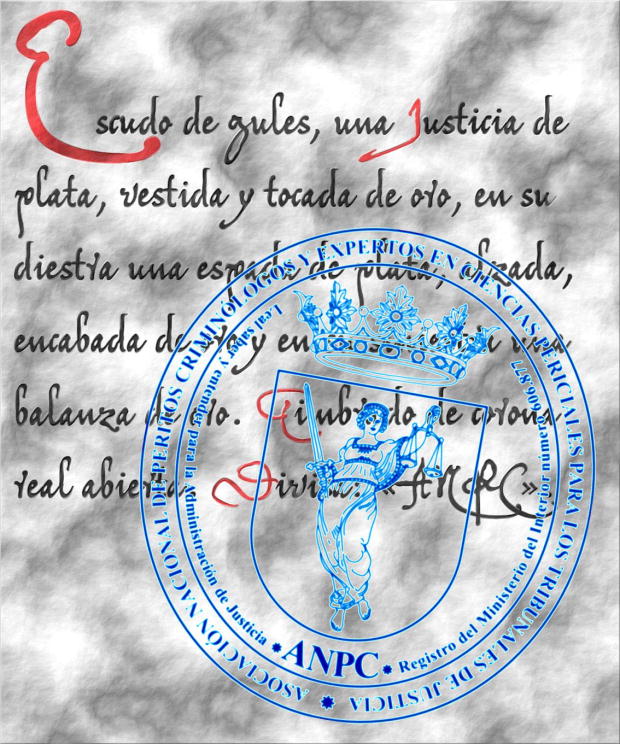
Registry of the Ministry of the Interior number 606.877.
Anpc.seal
Sello ovalado que contiene un [ escudo con una Justicia, en su diestra una espada, alzada y en su siniestra una balanza. Timbrado de una corona real abierta ]. Las divisas y los lemas rodean el sello.
I have created the seal of the National Association of Criminology Experts and Experts in Forensic Sciences for the Courts of Justice, based on its previous seal and derived from its emblem.
The shield of the seal and the emblem has the female figure of Justice. In Spanish heraldry, as demonstrated in [Valero de Bernabé, L.; 2012a; page 3] and in [Valero de Bernabé, L.; 2012b; page 25 and 26], it has a 13 times lower occurrence, 93% versus 7%, than the male figure.
Blazon keywords: Without divisions, Female figure, Vested, Dexter, Sword, Point upwards, Hilted, Sinister, Pair of scales, Motto (identification) and Motto.
Style keywords: Oval and Semi-circular.
Classification: Seal, Created and Socioeconomic.
Bearer: ANPC.


ANPC, associate member seal
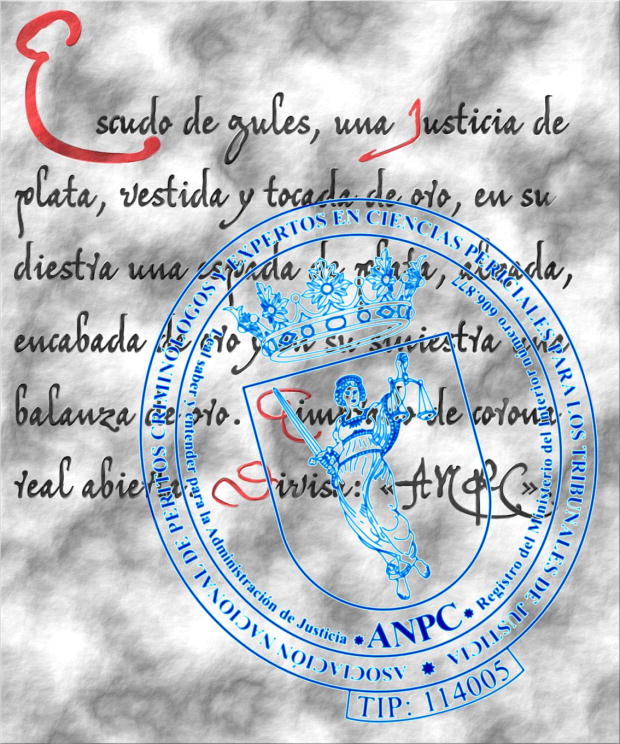
Loyal knowledge and understanding for the Administration of Justice.
Anpc.seal In the base of the oval the TIP number.
Sello ovalado que contiene un [ escudo con una Justicia, en su diestra una espada, alzada y en su siniestra una balanza. Timbrado de una corona real abierta ]. Las divisas y los lemas rodean el sello. En la punta del óvalo el número TIP.
The associate member's seal is similar to that of the association including at its base the professional identification card number, called TIP.
Blazon keywords: Without divisions, Female figure, Vested, Dexter, Sword, Point upwards, Hilted, Sinister, Pair of scales, Motto (identification) and Motto.
Style keywords: Oval and Semi-circular.
Classification: Seal, Created and Socioeconomic.
Bearer: ANPC.

Continue with: ANPC, heraldic catalog of 6 pieces.
-
Language
-
Categories of heraldry
-
Divisions of the field
- Without divisions
- Party per pale
- Party per fess
- Party per bend
- Party per bend sinister
- Tierce
- Tierce sinister
- Tierced per pale
- Tierced per fess
- Tierced per bend
- Tierced pallwise inverted
- Quarterly
- Quarterly per saltire
- Gyronny
- Party per fess, the chief per pale
- Party per pale, the sinister per fess
- Party per fess, the base per pale
- Party per pale, the dexter per fess
- Chapé
- Chaussé
- Embrassé
- Contre-embrassé
- Party per chevron
- Enté
- Enté en point
- Flanched
-
Metals
-
Colours
-
Furs
-
Other tinctures
-
Ordinaries and sub-ordinaries
-
Diminutives of the ordinaries
-
Geometric charges
-
Composite ordinaries
-
Inanimate charges from Nature
Atom, Crescent, Diamond, Emerald, Estoile, Increscent, Lightning flash, Moon, Mount, Mullet, Mullet of four points, Orbital, Plough of Ursa Major, Rainbow, Ray of the sun, River, Sea, Snowflake, Sun, Sun in splendour, Sun of May, Trimount, Water and Wave.
-
Vegetal charges from Nature
Acorn, Apple, Apple tree, Ash, Bluebonnet, Camellia, Chrysanthemum, Cinquefoil, Cornflower, Dogwood flower, Double rose, Elm, Fleur de lis, Flower, Gourd, Holm oak, Hop cone, Kapok tree, Laurel, Lily, Linden, Lotus flower, Madonna lily, Mexican cedar tree, Oak, Olive tree, Palm tree, Plantain plant, Pomegranate, Poplar leaf, Rose, Shamrock, Sunflower, Thistle, Tree, Tulip, Vine and Wheat.
-
Animal charges from Nature
Badger, Bald eagle, Barbel, Barn owl, Bear, Beaver, Beetle, Bighorn sheep, Blackbird, Boar, Brach hound, Bull, Doe, Dog, Dolphin, Dove, Eagle, Elephant, Falcon, Female figure, Fish, Flame, Fly, Fox, Frog, Goat, Goldfinch, Goose, Heron, Horse, Hummingbird, Jaguar, Lark, Leopard, Lion, Lion passant, Lion rampant guardant, Lioness, Lynx, Male figure, Martlet, Merino ram, Owl, Panther, Parrot, Peacock, Pelican, Pelican in her piety, Puffin, Quetzal, Raven, Roe deer, Rooster, Savage, Seagull, Serpent, She-wolf, Stag, Starling, Talbot, Tyger, Vulture, Warren hound and Wolf.
-
Parts of natural charges
Arm, Beak, Branch, Caboshed, Chest, Claw, Covert, Dorsal fin, Eagle claw, Ermine spot, Escallop, Feather, Foot (palmiped), Foreleg, Forepaw, Hand, Head, Heart, Hoof, Leaf, Neck, Ostrich feather, Palm frond, Paw, Roe deers' attires, Shoulder, Sprig, Stags' attires, Stem, Swallow-tail, Tail, Tail addorsed, Tail fin, Talon, Tooth, Trunk, Trunk (elephant), Two hands clasped, Two wings in vol, Udder, Wheat spike, Wing and Wrist.
-
Artificial charges
Ace of spades, Anchor, Anvil, Arch, Arm vambraced, Armillary sphere, Arrow, Axe, Bell, Bell tower, Beret, Bonfire, Book, Bookmark, Bow, Branding iron, Bridge, Broken, Buckle, Cannon, Cannon dismounted, Cannon port, Canopy roof, Carbuncle, Castle, Celtic Trinity knot, Chain, Chess rooks, Church, Clarion, Clay pot, Closed book, Club, Column, Comb, Compass rose, Conductor's baton, Cord, Covered cup, Crozier, Crucible, Cuffed, Cup, Cyclamor, Dagger, Double vajra, Drum, Ecclesiastical cap, Fanon, Federschwert, Fleam, Four crescents joined millsailwise, Galician granary, Garb, Gauntlet, Geometric solid, Grenade, Halberd, Hammer, Harp, Host, Hourglass, Key, Key ward, Knight, Knot, Lantern, Letter, Line, Loincloth, Menorah, Millrind, Millstone, Millwheel, Monstrance, Mortar, Mullet of six points pierced, Nail, Non-classic artifact, Norman ship, Number, Oar, Oil lamp, Open book, Page, Pair of scales, Parchment, Pestle, Piano, Pilgrim's staff, Plough share, Polish winged hussar, Port, Portcullis, Potent, Quill, Ribbon, Rosette of acanthus leaves, Sabre, Sackbut, Sail, Scroll, Scythe, Sheaf of tobacco, Ship, Skirt, Spear, Spear's head, Stairway, Star of David, Step, Sword, Symbol, Tetrahedron, Torch, Tower, Trident, Trumpet, Turret, Two-handed sword, Wagon-wheel, Water-bouget, Wheel, Winnowing fan and With a turret.
-
Immaterial charges
Angel, Archangel, Basilisk, Dragon, Dragon's head, Garuda, Golden fleece, Griffin, Heart enflamed, Justice, Mermaid, Our Lady of Mercy, Ouroboros, Paschal lamb, Pegasus, Phoenix, Sacred Heart of Jesus, Saint George, Sea-griffin, Trinity, Triton, Unicorn, Winged hand and Wyvern.
-
External elements
-
Heraldic creations
-
References
-
Formats
-
Keywords on this page
ANPC, Watercolor, Point upwards, Pair of scales, Bibliography, Catalogue, Crest, Crown, Open royal crown, Created, Outlined in the field tincture, Dexter, Motto (identification), Heraldic document, Emblem, Coat of arms, Sword, Female figure, Hilted, Gules, Illuminated, Justice, Motto, Semi-circular, Or, Oval, Argent, Without divisions, Seal, Century XXI, Sinister, Socioeconomic, Shaded, Plain tincture, One, Vested and Video.
